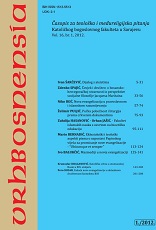Klement Aleksandrijski i prihvaćanje grčke filozofije u aleksandrijskoj Crkvi koncem 2. stoljeća
Clement of Alexandria and the acceptance of Greek philosophy in the Alexandrian Church at the end of the 2nd century
Author(s): Ivan BodrožićSubject(s): Philosophy
Published by: Katolički bogoslovni fakultet
Keywords: Clement of Alexandria; Christianity; philosophy; propaedeutics; gnosis
Summary/Abstract: From its beginnings, spreading among the pagans, Christianity was in contact with Hellenistic culture, and especially with Hellenistic philosophy. As a result of this, Christianity began, albeit reluctantly, a process of close engagement with Hellenistic culture based on mutual respect and highlighting those elements of the culture that Christians regarded as being sound. Far from being painless this process was in fact very painful and it was characterized by tension and by fundamental disagreements. Disagreements arose first of all within the Christian community, which did not have a common stand about accepting or rejecting philosophy; it was therefore necessary to establish internal clarity. At the same time, the relationship with philosophy as an external collocutor was problematic because it was necessary to avoid extreme solutions – from one side a radical rejection and from the other non-critical acceptance. The process reached its conclusion in a positive way with mutual respect, thanks to those Christian writers who understood as well trained philosophers that there was no fundamental contradiction between Christianity and philosophy – a truth which these writers learned from their own rich life experience. In the article, which is divided into three parts, the author shows that Clement of Alexandria was one of the most meritorious of the early Christian fathers, the first to explain and defend wholehearted acceptance of Greek philosophy, contrary to some Christian circles which preferred a radical rejection of philosophy. The first section describes how in the early Christian era the “question of philosophy” was complex and delicate and how acceptance was accompanied by resistance, for example in the writings of Tatian and Tertullian. Resistance can also be seen in some circles of the Alexandrian Church who criticized Clement’s position. The author seeks to reconstruct central arguments of “enemies of philosophy”. In the second and third sections of the article the author describes Clement’s method of addressing these arguments and his demonstration that philosophy serves as a helpful propaedeutics of Christianity.
Journal: Vrhbosnensia
- Issue Year: 2012
- Issue No: 2
- Page Range: 291-306
- Page Count: 16
- Language: Croatian

